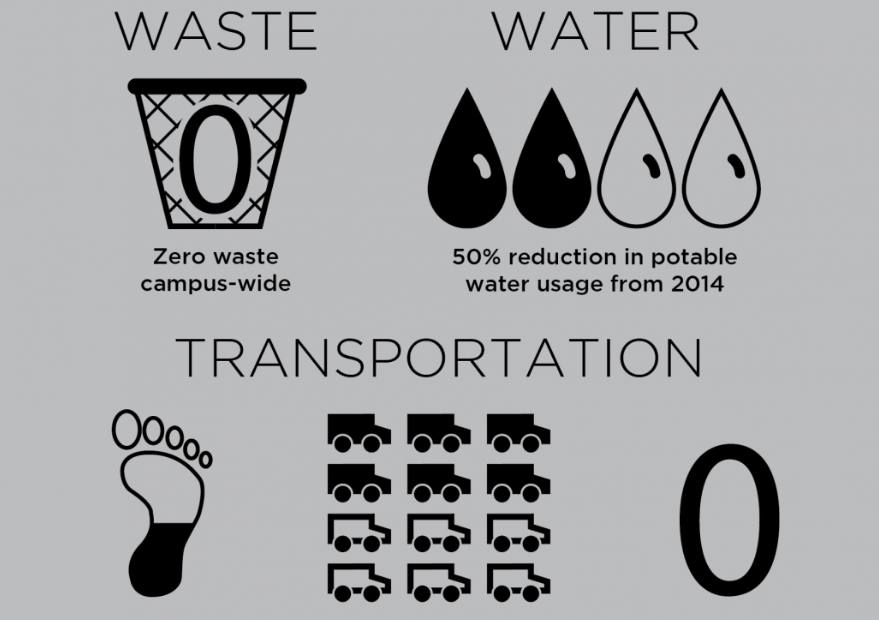Other articles in the October newsletter:
- President’s Blog, October 2017
- Senate Retreat: Controversy and Challenges in the Higher Education Community
- Senate Retreat: Teaching 2030
Environmental sustainability is one of the most critical challenges facing humanity in the 21st century. USC’s Mission—“the development of human beings and society as a whole through the cultivation and enrichment of the human mind and spirit”—calls on us to develop a University-wide strategic response.
The USC Academic Senate Sustainability Committee recently produced the USC Sustainability Strategy 2030, a proposal that advocates and outlines goals and strategies for the university to take a position of leadership in environmental sustainability. The 2030 Proposal calls for bolder action to prioritize and integrate the various dimensions of sustainability on campus—education and research, operations, facilities and finances—into a longer-term strategy and broader vision. The Proposal has received broad support along with votes of endorsement from the Academic Senate, Staff Assembly, Graduate Student Government (GSG), and Undergraduate Student Government (USG).
PROPOSED SUSTAINABILITY 2030 GOALS
With the aim of catalyzing a university-wide discussion and of prompting the university leadership to articulate an ambitious, long-term vision and strategy, the 2030 Proposal offers some possible goals for each of the major dimensions of sustainability. Using the system developed by the Association for the Advancement of Sustainability in Higher Education (AASHE) (http://www.aashe.org/), and building upon the USC 2020 Sustainability Plan, the Senate Proposal calls for the following advances by 2030:
- Education & Research: USC will be widely recognized regionally, nationally, and internationally as a leader in teaching and research on a wide range of environmental sustainability issues.
- Community Engagement: USC will regularly develop, lead, and engage in strategic partnerships on campus and in the community to promote sustainability practices and education.
- Energy Conservation: USC will achieve carbon neutrality across all campus buildings.
- Transportation: USC will reduce by 50% single occupancy vehicles (SOVS) from 2014 levels; convert the university motor fleet to zero emissions (excluding emergency vehicles and large trucks); reduce by 50% the university’s carbon footprint; and position USC as a visible and progressive participant in local, regional, and international sustainable transportation activities.
- Procurement: USC will be a recognized leader among higher education institutions in using its purchasing power to encourage environmentally sustainable operations in its supply chain.
- Waste: USC will achieve campus-wide “zero waste” (90% waste diversion) from 2014 levels on all USC campuses.
- Water: USC will reduce potable water usage by 50% from 2014 levels across all USC campuses.
From Strategy to Implementation
Implementing a Sustainability Strategy of this ambition and complexity will require a much enhanced level of coordination, collaboration, and communication across the various functional areas of the Administration and across the various Schools. The Senate Proposal recommends creating a Sustainability Leadership Council, chaired by the University President, and including the Provost, two or three select Deans, the two university SVPs, and a Chief Sustainability Officer (CSO) to ensure a more appropriate level of strategic leadership, and to develop and integrate sustainability initiatives in academics, research, and operations. This Council will oversee the work of a considerably enlarged Sustainability Office staff.
To view the full USC Sustainability Strategy 2030 proposal or to learn more about the Academic Senate Sustainability Committee visit: https://academicsenate.usc.edu/committees/sustainability/
Please send comments to Darren Ruddell at druddell@usc.edu or at our Facebook post.
Thank you,

Darren Ruddell
Chair of the Sustainability Committee
Associate Professor of Spatial Sciences
Dornsife College of Letters, Arts and Sciences
University of Southern California

